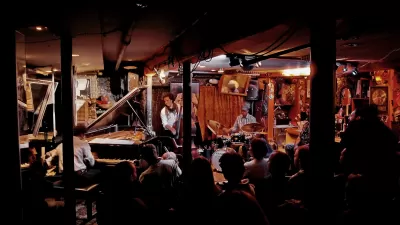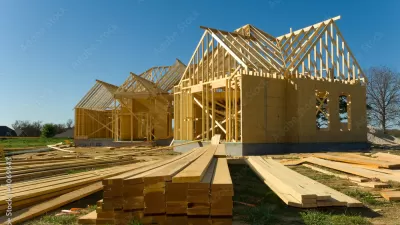A group of venue owners formed in response to the pandemic successfully got a $15 billion support bill passed to help small venues stay afloat during the pandemic.

Writing for Bloomberg CityLab, Rebecca Greenwald reports on the Save Our Stages Act, an initiative started by music venue owners that could help prop up independent venues during pandemic closures. Signed into law on December 27, the $15-billion piece of legislation is an unprecedented show of support for arts and culture—"for context, the National Endowment for Arts has awarded a total of around $5.5 billion since its founding in 1965."
Originally proposed by a newly formed nationwide coalition of music venues, the National Independent Venue Association (NIVA), the Save Our Stages Act recognizes the challenges faced by live entertainment venues, whose expenses to keep shuttered venues alive are putting many of them out of business. Unlike other businesses, federal programs like the Small Business Administration's Paycheck Protection Program don't necessarily help music venues. "The program’s mandate to put the majority of funds towards payroll rather than rent, mortgage, utilities and other overhead costs was completely untenable for businesses that weren’t open or operational," writes Greenwald, citing the average rent for independent venues as ranging between $10,000 and $60,000 per month.
Championed by Minnesota Senator Amy Klobuchar and co-sponsored by Texas Senator John Cornyn, the Save Our Stages Act focuses on "small business and economic recovery" and marks a "momentous occasion" for the NIVA. The group plans to continue its activism after the pandemic and use their newfound political voice to be "a player in Washington."
FULL STORY: How Music Venues Convinced Congress to Save Live Entertainment

Alabama: Trump Terminates Settlements for Black Communities Harmed By Raw Sewage
Trump deemed the landmark civil rights agreement “illegal DEI and environmental justice policy.”

Planetizen Federal Action Tracker
A weekly monitor of how Trump’s orders and actions are impacting planners and planning in America.

The 120 Year Old Tiny Home Villages That Sheltered San Francisco’s Earthquake Refugees
More than a century ago, San Francisco mobilized to house thousands of residents displaced by the 1906 earthquake. Could their strategy offer a model for the present?

In Both Crashes and Crime, Public Transportation is Far Safer than Driving
Contrary to popular assumptions, public transportation has far lower crash and crime rates than automobile travel. For safer communities, improve and encourage transit travel.

Report: Zoning Reforms Should Complement Nashville’s Ambitious Transit Plan
Without reform, restrictive zoning codes will limit the impact of the city’s planned transit expansion and could exclude some of the residents who depend on transit the most.

Judge Orders Release of Frozen IRA, IIJA Funding
The decision is a victory for environmental groups who charged that freezing funds for critical infrastructure and disaster response programs caused “real and irreparable harm” to communities.
Urban Design for Planners 1: Software Tools
This six-course series explores essential urban design concepts using open source software and equips planners with the tools they need to participate fully in the urban design process.
Planning for Universal Design
Learn the tools for implementing Universal Design in planning regulations.
Clanton & Associates, Inc.
Jessamine County Fiscal Court
Institute for Housing and Urban Development Studies (IHS)
City of Grandview
Harvard GSD Executive Education
Toledo-Lucas County Plan Commissions
Salt Lake City
NYU Wagner Graduate School of Public Service




























